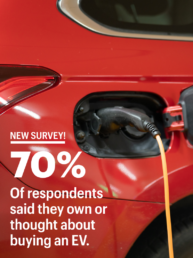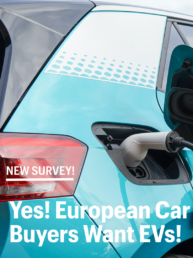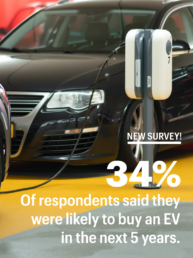New Study
European consumers want electric vehicles
The Platform for electromobility – representing more than 45 organisations from industry, civil society and cities, and across all transport modes – released a report carried out by Element Energy on consumer’s perception on the shift to electric vehicles (EV). The study, which surveyed 14,000 new car buyers across Europe shows that consumers are ready to move to electric.




Our policy recommendations
Significantly strengthen CO2 standards for passenger cars and vans targets
The importance of upfront cost in unlocking massive EV uptake highlights the need for ambitious regulation on CO2 Standards for cars and vans to ensure production scale up during the 2020s. An ambitious legislation will increase the offer and promote the market uptake of zero-emission vehicles. With an increased market, zero-emissions vehicles will also become more affordable at purchase price with a continuously reduced total cost of ownership and more choice for consumers and will also help tackle air quality and noise issues, bringing an overall benefit to society. As detailed above, the study confirms the feasibility of new proposed interim targets will be met by strong consumer demand.
Under the CO2 standards for passenger cars and vans, introduce a new provision to electrify corporate fleets
The study demonstrates the importance of corporate fleets in driving markets for electric vehicles. The Platform for electromobility therefore proposes to mandate the decarbonisation of corporate cars by 2030. In a previous communication, the group outlined the environmental and social benefits which such an EU-level mandate could bring. One major motive is for the EU to act quickly and decisively electrify a segment representing over 60% of vehicles sales in Europe and subsequently create a sufficient second-hand market by 2035 as most private consumers use this channel. To enshrine electrification objectives for corporate fleets in EU law, the Platform support the proposition by Rapporteur Huitema to revise the Clean Vehicles Directive (CVD). Its scope could be extended to corporate fleets as part of the revision of the CO2 Standards for cars and vans Regulation.
Do not introduce fuel crediting in the CO2 standards for passenger cars and vans
The study shows e-fuels as a dead-end solution for consumers. Even at a seemingly unreachable price parity with BEVs, consumers would still opt for the electric option. The Platform is opposed to introduction of a fuel crediting mechanism that would consider the contribution of renewable and low carbon fuels in the compliance assessment for each manufacturer. Policies focused on decarbonising fuels and those focused on reducing emissions from cars and vans must remain in separate legal instruments.
Under the Alternative Fuels Infrastructure Regulation, we need more ambitious targets for EV uptake
The Platform for electromobility believes the Commission’s AFIR proposal is a good start but, to ensure charging points keep up with the EV uptake, the level of ambition of the mandatory targets for light-duty vehicles must be doubled. For long distance journeys, the targets for the TEN-T comprehensive network should be brought forward to 2025.
The Energy Performance of Buildings Directive should facilitate the access to private charging
The revision of EPBD must ensure the right-to-plug to all EV users in order to facilitate the installation of charging infrastructure for tenants and properties under shared ownership. Drivers willing to make the transformation often face diverse obstacles: latency between requesting a charger and installation, installation of charging infrastructure for tenants and properties under shared ownership, lack of electrical pre-equipment in collective electrical installations etc. Smart charging is also required in all types of buildings as it provides benefits to both the power sector and the EV users. The revision of the Energy Performance of Buildings Directive is therefore very timely to address those challenges and ensure a minimum level of charging points in all off-street parking lots.
